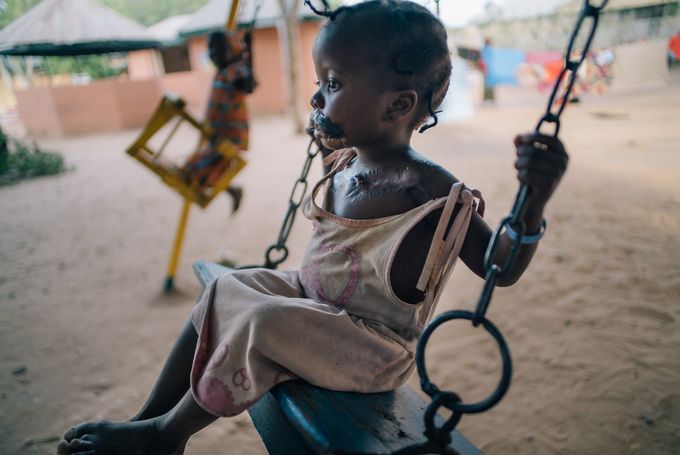New Publication Sets Global Research Priorities to End Noma
22.04.2025
A new publication by Swiss TPH and partners defines a global research agenda to tackle noma – a devastating and life-threatening disease mainly affecting children living in extreme poverty. The publication draws on the outcomes of a symposium organized by Swiss TPH and the Noma Survivors Association Elysium, which brought together more than 100 experts, noma survivors and public health stakeholders from around the world. The findings, published today in PLOS Neglected Tropical Diseases, mark a major step in translating the recent WHO recognition of noma as a neglected tropical disease into coordinated research and action.

copyright: © Claire Jeantet - Fabrice Catérini / Inediz
Noma causes rapid and disfiguring facial tissue destruction and has a mortality rate of up to 90% if left untreated. Despite its severity, noma has long remained neglected in global health research and policy. Its official recognition by the World Health Organization (WHO) as a Neglected Tropical Disease (NTD) in late 2023 has brought new visibility and urgency.
“This publication is a call to action for the global health community,” said Anaïs Galli, co-lead author of the study and researcher at Swiss TPH. “For the first time, we have a clearly defined and community-driven research roadmap that reflects both scientific priorities and the lived experiences of those affected.”
The new study defines eight major areas where research is urgently needed:
- Clear case definitions to support diagnosis and harmonised data collection.
- Early detection and surveillance, particularly in remote and underserved areas.
- Psychosocial and economic impacts of noma on individuals and communities, and effective pathways for reintegration.
- Evidence-based diagnostic and treatment guidelines for early-stage noma and associated antibiotic use.
- Increased understanding of risk factors and social determinants, such as genetic factors, immunologic signatures or behavioural factors
- Tailored communication strategies for at-risk populations and health care workers, considering linguistic and cultural diversity.
- Effectiveness and accessibility of surgical care, including mobile surgical teams and long-term rehabilitation.
- Use of digital tools to support follow-up, peer support, education, and data collection.
These research priorities were developed through a full-day symposium hosted by Swiss TPH in collaboration with Elysium – Noma Survivors’ Association in September 2024. The event brought together experts, clinicians, policymakers, and noma survivors from across the globe.
Survivor perspectives at the forefront
A key strength of the symposium—and the resulting research agenda—was the direct involvement of individuals with lived experience of noma. People affected by noma, including survivors from endemic countries like Nigeria and Mozambique played an active role in shaping discussions and setting priorities.
“The active participation of noma survivors helped us to realize that research with people with lived experiences should focus more on opportunities for reintegration into everyday life, such as ways to return to school or become appealing on the job market,” said Galli.
This participatory approach reflects a broader shift in neglected disease research, in line with WHO guidelines for the meaningful engagement of affected populations.
A stronger focus on integration and synergies
The publication also highlights opportunities to integrate noma research into existing NTD frameworks, alongside conditions such as leprosy and Buruli ulcer, and other health and nutrition programs. These integrated approaches can improve cost-efficiency and enable coordinated action in surveillance, diagnostics, and health system strengthening.
“No one should have to suffer or die from a disease that is preventable and treatable,” said Mulikat Okabnlawon, President of Elysium Noma Survivors Association. “The solution is in our hands: we must collaborate across borders and sectors to achieve food security, access to healthcare, improved hygiene, and ultimately a global reduction of poverty.”
A broader vision
The research agenda sets a precedent for how NTD research can be more inclusive, interdisciplinary, and impact-driven. The publication serves as a model for prioritising research that aligns with both scientific needs and community realities.
“It is not just about defining a research agenda that will take this disproportionately neglected disease out of the shadows,” said Marianne Comparet, Director of the International Society for Neglected Tropical Diseases. “We also want to create a blueprint or new paradigm of how research on a vast number of neglected diseases is conceptualised and executed.”
Contact

Anaïs Galli
PhD Student
+41612849252
anais.galli@swisstph.ch
Stay connected
Subscribe to our newsletter and get all the latest research news, project updates, course and event listings from Swiss TPH.